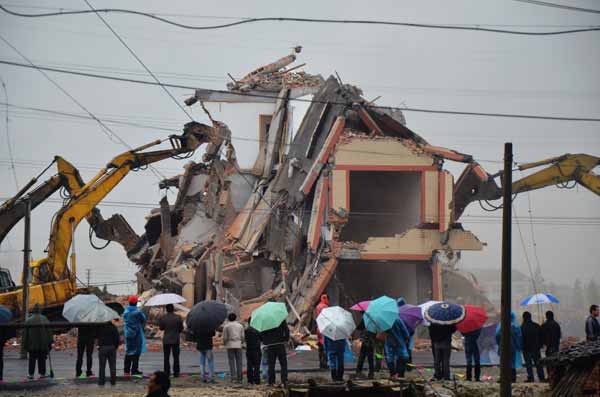A credibility test for local administration
Updated: 2015-09-18 08:29
(China Daily)
|
|||||||||||
 |
|
People watch a house being demolished in Wenling city, Zhejiang province, after its owner reached an agreement with the local government. [Photo/China Daily] |
Was the death of a villager on Monday the result of his own act of arson, or was it a tragedy triggered by the local government's attempt to demolish his house by force? This is not a question only about one death. It is about whether a local government's behavior can add to its credibility or reduce its worthiness.
The dead villager's family and other villagers interviewed in Pingyi county, East China's Shandong province, said there was a connection between the fire and the attempted forced demolition. But the local government said the villager torched his own property and killed himself. Video clips show some people throwing rocks at the house while it was on fire.
Another important fact is that the villager's wife was kidnapped on the same day and shoved into a minivan on her way back home after sending her children to school. She was physically abused and is still in hospital.
Many villagers said that this was not the only case of forced demolition in the village, which is supposed to be transformed into a new community along with two nearby villages.
If anything, the incident calls for a thorough investigation to find the truth and determine whether the local government should be held accountable for the villager's death.
A recently published survey conducted by Tony Saich, a professor at Harvard University, showed that while the majority of the 3,500 respondents were quite satisfied with the central government, their satisfaction level declined with each lower-level government.
That a local government as provider of almost all public services is not on good terms with the people it governs is the last thing the central government wants to see, not least because it points to the most vulnerable part of the social fabric which needs immediate mending in order to maintain social stability.
What is in question is the governing philosophy of local government officials who justify their actions even if they are against the rights and interests of the people they govern, including forced demolition of houses that stand in the way of real estate or other development projects. Instead of placing people's interests first, this philosophy prioritizes the will of local government leaders and condemns that of the governed to lower levels.
Yet by pursuing their own policies against the will of local residents, by force sometimes, they are stoking public dissatisfaction against the government and the ruling Party. This is certainly not the right approach to governance.
Related Stories
'Nail houses' in the way, before and after demolition 2015-06-11 09:25
Demolition leads to care home 2015-02-04 07:52
Old photographs on display at neighborhood slated for demolition in Fuzhou 2015-01-13 15:37
Shame of AIDS demolition' team 2014-12-26 07:39
Fuzhou puts brakes on demolition of ancient sites 2014-09-03 16:37
Forced demolition of couple's home probed 2014-08-13 07:40
Today's Top News
EU's Tusk calls EU summit on migration
At least three killed as powerful quake hits off coast of Chile
Australian father takes on Chinese drug dealers after son's death
Senior securities watchdog official under investigation
Transactions on overseas real estate projected to hit $220b
Migrants in Serbia reroute to Croatia
UK Labour leader Corbyn takes on ritual at first Cameron duel
Britain marks 75th anniversary of victory in Battle of Britain
Hot Topics
Lunar probe , China growth forecasts, Emission rules get tougher, China seen through 'colored lens', International board,
Editor's Picks

|

|

|

|

|

|






